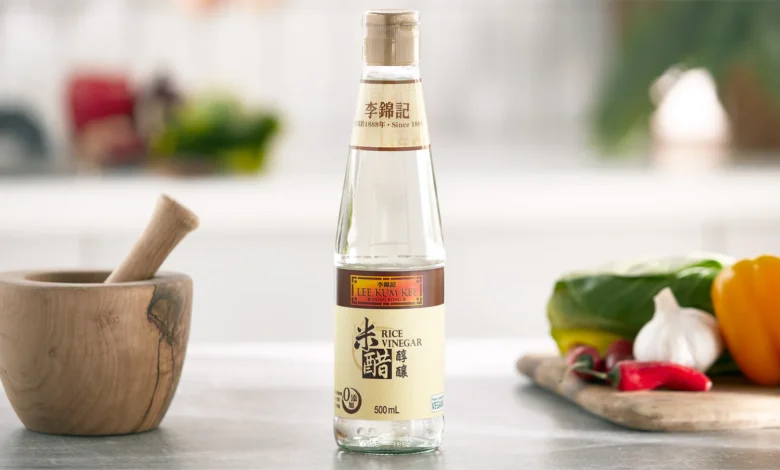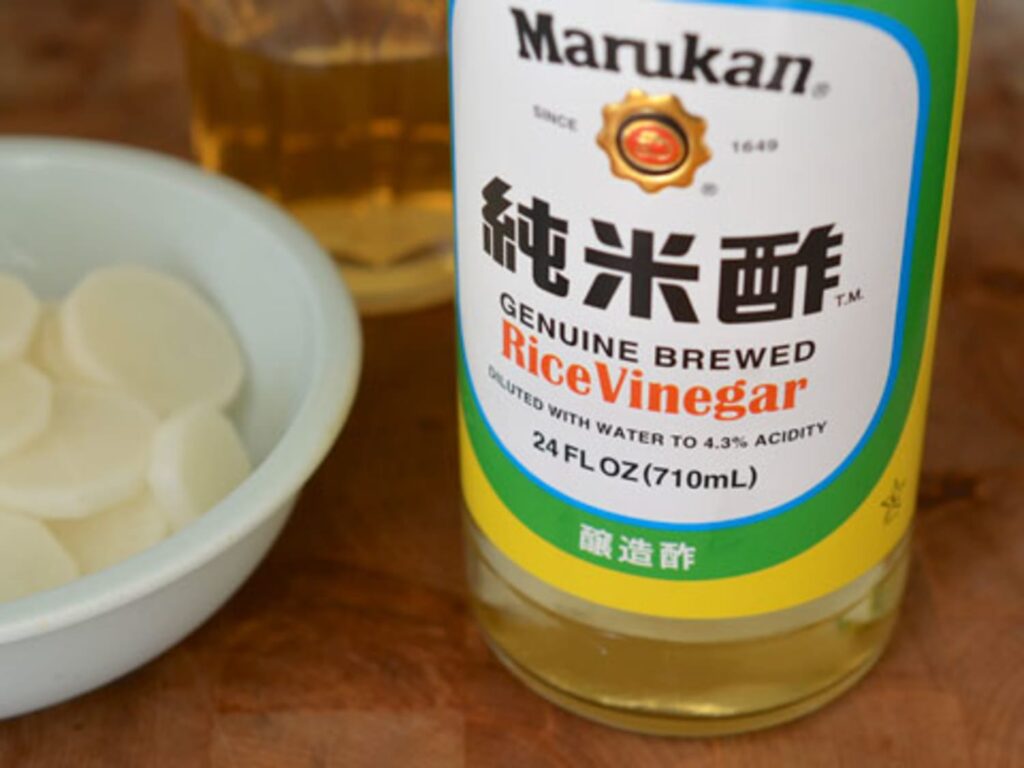The Magic of Rice Vinegar: A Staple for Every Kitchen

Rice vinegar is one of those magical ingredients that transforms ordinary dishes into extraordinary ones. Whether you’re drizzling it over a fresh salad, using it to pickle veggies, or adding a zing to your stir-fry, rice vinegar brings a subtle, tangy brightness that no other vinegar can quite match. It’s been beloved in Asian cuisine for centuries, and now, it’s finding a permanent spot in kitchens all over the world.
When you first taste this, you immediately notice its mellow acidity. It’s not as harsh as white vinegar or even apple cider vinegar. Instead, it offers a delicate, slightly sweet flavor that can enhance countless dishes without overpowering them. If you haven’t stocked your pantry with this yet, you’re seriously missing out on an essential culinary tool.
What Exactly Is Rice Vinegar?
It is a type of vinegar made by fermenting rice or rice wine. The process involves converting the sugars from rice into alcohol and then into acid. What you’re left with is a wonderfully smooth, slightly sweet, and delightfully tangy liquid that’s versatile and easy to use.
There are different types of this available, ranging from white rice vinegar to seasoned rice vinegar and black rice vinegar. Each type has its own flavor profile and culinary uses. White rice vinegar is more neutral and is great for a wide variety of dishes. Seasoned this often contains added sugar and salt, making it perfect for sushi rice. Black rice vinegar, deeper and richer in flavor, is commonly used in Chinese cooking.
This differs from other vinegars not just in flavor but also in acidity levels. Typically, it has a lower acidity percentage, which means it’s less sharp and more palatable when used in salad dressings, marinades, and dipping sauces. Its mildness is exactly why it’s such a star in many recipes.
How Is Rice Vinegar Made?

The traditional method of making this is a slow and delicate process. First, rice is fermented to produce alcohol, usually in the form of rice wine. Then, specific types of bacteria are introduced to convert the alcohol into acetic acid, resulting in vinegar. The entire fermentation process can take weeks or even months, depending on the method used and the flavor profile desired.
Many commercial producers speed up the fermentation process to meet high demand, but authentic, artisanal it producers often stick to the time-honored methods. This slower fermentation develops a more complex, nuanced flavor that you simply can’t rush. It’s this attention to detail that makes high-quality it stand out.
Different Types of Rice Vinegar You Should Know
Exploring the types of it can open up a whole new world of flavor possibilities. Here’s a breakdown of the main varieties you’re likely to come across:
White Rice Vinegar: This is the most common type. It’s clear, clean-tasting, and slightly sweet. It works beautifully in everything from salad dressings to stir-fries.
Seasoned Rice Vinegar: As the name suggests, this vinegar is pre-seasoned with sugar and salt. It’s the go-to for making perfect sushi rice but can also add a bright pop of flavor to simple vegetable dishes.
Black Rice Vinegar: Made from black glutinous rice, this variety has a deeper, almost smoky flavor. It’s thicker and darker, and it’s often used in Chinese braised dishes and dipping sauces.
Red Rice Vinegar: This variety, popular in Chinese cooking, has a bold flavor and reddish color. It’s made from fermented red yeast rice and is typically used in richer, heavier dishes.
Knowing which type to use can really elevate your cooking. Each variety brings something unique to the table, and once you get familiar with them, you’ll find countless ways to incorporate this into your meals.
The Nutritional Benefits of Rice Vinegar
It doesn’t just taste great—it also brings some health perks to the table. Although it’s often used in small amounts, those little splashes of vinegar can add up to noticeable benefits over time.
Rice vinegar contains amino acids that can help boost your immune system. Some studies suggest that these acids may also help with digestion and even offer antioxidant properties. Because it’s lower in calories compared to heavy dressings or sauces, using rice vinegar is a smart way to add flavor without extra fat or sugar.
Another perk? It might help regulate blood sugar levels. Some research shows that consuming vinegar before meals can improve insulin sensitivity. While more research is needed, it’s a promising sign that your favorite sushi condiment might be doing more than just making your meals tastier.
How to Use Rice Vinegar in Everyday Cooking

It is incredibly versatile, and once you start experimenting with it, you’ll wonder how you ever cooked without it. Here are some easy ways to use it in your everyday dishes:
Salad Dressings: Swap out lemon juice or balsamic vinegar for rice vinegar to create a lighter, fresher dressing. Just mix rice vinegar with olive oil, a little honey, and a pinch of salt for an easy vinaigrette.
Marinades: This is excellent for marinating meats, seafood, and tofu. It tenderizes proteins while adding a bright flavor. Try mixing it with soy sauce, garlic, and ginger for a quick Asian-inspired marinade.
Pickling: Quick-pickling vegetables like cucumbers, carrots, and radishes with this is a game-changer. It’s an easy way to add a crunchy, tangy element to your dishes without much effort.
Stir-Fries: A splash of rice vinegar at the end of cooking can liven up stir-fried veggies or noodles. It brightens the flavors and balances any richness from oils or sauces.
Sushi Rice: If you’ve ever made sushi at home, you know how important seasoned this is for getting that perfect flavor in your rice.
It can even be used in desserts! A tiny bit can enhance fruit salads or even some baked goods by balancing sweetness with a subtle hint of acid.
FAQs
Can I substitute rice vinegar with another vinegar?
You can, but the results will vary. White wine vinegar or apple cider vinegar can work in a pinch, but they are sharper. If substituting, start with a little less and taste as you go.
Is rice vinegar gluten-free?
Most pure this are naturally gluten-free. However, always check the label, especially for seasoned varieties, to make sure no gluten-containing additives have been introduced.
Does rice vinegar go bad?
It has a long shelf life, especially if kept sealed in a cool, dark place. Over time, it may lose some potency, but it doesn’t spoil easily. If it smells off or looks cloudy in an unusual way, it’s time to replace it.
What’s the difference between seasoned and unseasoned rice vinegar?
Seasoned it has added sugar and salt, making it sweeter and more flavorful straight from the bottle. Unseasoned rice vinegar is plain and better for when you want to control the seasoning yourself.
Is rice vinegar the same as rice wine vinegar?
Yes, rice vinegar and rice wine vinegar are the same thing. It’s just different naming conventions depending on the region.
Conclusion
This is truly one of those secret weapons that every home cook should have on hand. Its delicate flavor, versatility, and health benefits make it an all-around superstar in the kitchen. Once you start using rice vinegar in your everyday recipes, you’ll quickly understand why it’s a staple in so many cuisines around the world.





